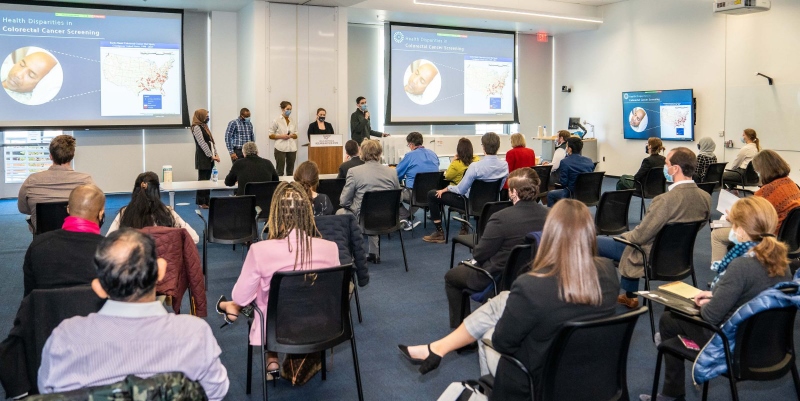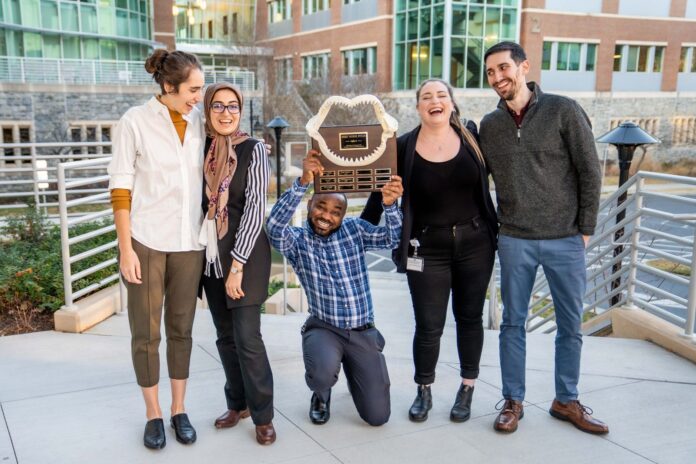Virginia Tech students pitched commercialization ideas for biomedical innovations to a “Shark Tank”-style panel of judges during the annual Health Sciences and Technology (HS&T) Hokie Pitch at the Fralin Biomedical Research Institute at VTC in Roanoke on Wednesday.
The competition involved students from the Translational Biology, Medicine, and Health (TBMH) graduate program, who selected intellectual property (IP), worked with real-world business mentors, and created an entrepreneurial plan to develop and commercialize biomedical discoveries as new companies.
“Hokie Pitch is always exciting,” said Rob Gourdie, the Commonwealth Research Commercialization Fund eminent scholar in Heart Reparative Medicine Research at the Fralin Biomedical Research Institute, and director of the institute’s Center for Vascular and Heart Research, who planned the transdisciplinary commercialization exercise. “It is exhilarating to watch the students do the research that it takes to discover intellectual property, build a business plan, and to watch them pitch their ideas to judges under the spotlight. It really shows how far they have come professionally.”
In the process of the Hokie Pitch exercise, students identified a biomedical need, researched undisclosed intellectual property for a solution, and made a case that would appeal to investors.
“The talent to bring a discovery forward and provide a solution to help people in Virginia and the world is essential to keeping the promise of the biomedical science enterprise and is an example of the Virginia Tech Ut Prosim [That I May Serve] ethos,” said Michael Friedlander, Virginia Tech’s vice president for health sciences and technology, and executive director of the Fralin Biomedical Research Institute and one of the judges of the competition. “It takes more than a good idea to make a positive difference in the world. When these students begin professional careers after completing doctoral degrees in TBMH, they will have to be comfortable with aspects of the worlds of science, business, the law, and communications to move innovations forward. They have demonstrated that they are genuinely interested in this path and very capable.”

Winning teams split $4,500 in cash prizes:
- First place, $2,000: team illuminostics presented an optical imaging agent for enhanced colonoscopy screening; team members, Mikel Cawley, Mary Frazier, Collin Gregg, Seun Imani, Mona Safari; mentor: Victor Iannello; IP consultant: Jonathan Joyce.
- Second place, $1,500: CTCapture team members pitched a device to capture and detect circulating metastatic cancer cells; team members, Catie Burgess, Zach Hutelin, Renesa Tarannum, Noor Tasnim, Elliana Vickers; mentor: Francis Farrell; IP Consultant: Amanda Hensley.
- Third place, $1,000: DialAssist team members planned a portable in-home dialysis; team members, Kari Stanley, Haylee Downey, Manali Patwardhan, Shah Rukh, Blake Flinchum; mentor, Cynthia Lawrence; IP Consultant: Meghan Sedovy.
Additional teams pitching ideas were:
- Team AdenoGuard presented an adenovirus-based vaccine that allows the immune system to recognize and respond to the highly addictive opioid fentanyl; team members, Paige van de Vuurst, Colin Kelly, Sahitya Biswas, Walt Tatera, Nazia Bano; mentor: Rocco DiSanto; IP Consultant: Zach Williams.
- Lambda Solutions team members proposed a wearable device for detection of pre-eclampsia in pregnancy; team members, Ruhul Amin, Megan Evans, Breana Turner, Mason Wheeler, Kenneth Young II; mentor: Sarah Snider; IP consultant: Kevin Pridham.
Pitches were judged by Friedlander; Maria Clarke of J.P. Morgan Private Bank, and a member of the Fralin Biomedical Research Institute advisory board; Fourd Kemper, an attorney and principal at Woods Rogers law firm; Troy Keyser, director of Carilion Innovation; Mary Miller, director at the Regional Accelerator and Mentoring Program; and James Ramey, managing director and fund manager at Middleland Capital’s VTC Innovation Fund.
The competition, now in its sixth year, was sponsored by the Fralin Biomedical Research Institute at VTC, Carilion Clinic, Woods Rogers PLC, and Clarke.
“I congratulate the students who had the courage to dive in, do the work, and present their ideas, as well as to the sponsors and team mentors for providing their time, expertise, support, and prize money to make the competition possible,” said Gourdie, who is also a faculty member in the department of biomedical engineering and mechanics of the College of Engineering.
Gourdie teaches in the Translational Biology, Medicine and Health Graduate Program’s gateway class, in which students participate in modules that take deep dives into contemporary issues of biomedical and health sciences. As an entrepreneur who has started several biotech companies, Gourdie originated the commercialization module to teach students how to turn great ideas into real-world solutions and products.
During the transdisciplinary course, students interacted with Virginia Tech faculty and commercialization executives, including Friedlander, Ramey of Middleland Capital VTC Innovation Fund, and Mark Mondry, director of LAUNCH, part of Virginia Tech’s LINK+LICENSE+LAUNCH team, which supports corporate partnerships, technology commercialization, and start-ups.
Also teaching was Mark Van Dyke, formerly of the College of Engineering at Virginia Tech and now associate dean of research at the University of Arizona; and Samy Lamouille, an assistant professor at the research institute and chief executive officer of Acomhal Research Inc.
Howard Haines, an assistant professor of practice at the Pamplin College of Business and associate director of Virginia Tech’s Innovate Living-Learning Community, worked with the student teams, along with Pamplin students Julee Hong, Madeleine Marietta, and Frank Lee, who served as business consultants.
Linda Collins, research and administrative coordinator of the Fralin Biomedical Research Institute Center for Vascular and Heart Research, assisted Gourdie with coordinating the teaching block.



